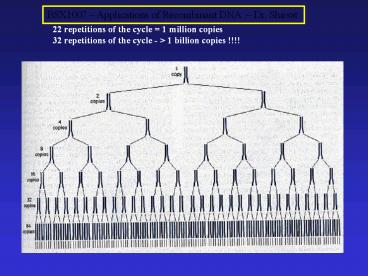22 repetitions of the cycle = 1 million copies - PowerPoint PPT Presentation
1 / 16
Title:
22 repetitions of the cycle = 1 million copies
Description:
Transgenic plant technology is based on Agrobacterium. ... Applications of Recombinant DNA Dr. Shirsat BSX1007 Applications of Recombinant DNA Dr. Shirsat . – PowerPoint PPT presentation
Number of Views:45
Avg rating:3.0/5.0
Title: 22 repetitions of the cycle = 1 million copies
1
22 repetitions of the cycle 1 million copies 32
repetitions of the cycle - gt 1 billion copies !!!!
2
PCR has numerous applications
1) Gene isolation
2) Mapping of complex traits
3) Molecular taxonomy
4) Forensic science ( DNA fingerprinting)
5) Isolating ancient DNA sequences
6) Diagnosis of inherited disease.
3
Professor Sir Alec Jefferys of Leicester
University realised ( in 1983) that VNTR
variation due to the presence of different
numbers of microsatellite repeat sequences at the
same chromosomal location could be used to
distinguish between individuals in a population
4
DNA fingerprinting is based on the fact that
individuals in a population have different
numbers of repetitive sequences at the SAME locus.
5
(No Transcript)
6
The principle of DNA fingerprinting is VERY
SIMPLE
Use PCR primers which amplify across the variable
region
In different individuals, bands of different
sizes will be amplified from the genome
This leads to the fingerprint unique for every
individual.
7
Rape Investigation
- Known blood sample of victim
- Known blood sample from defendant
- DNA size markers
- 4. Female fraction from vaginal swab of
- victim
- 5. Male fraction from vaginal swab of
- victim.
Q is the suspect (2) guilty?
8
Transgenic plant technology is used for
Production of higher yielding crops
Crops which are disease resistant
Crops which are pest resistant
Crops which grow in saline soils
Crops with altered ripening characteristics
Flavr-Savr tomatoes
Herbicide resistant crops.
9
Transgenic plant technology is based on
Agrobacterium.
Agrobacterium the natural genetic engineer
carries a plasmid (Ti) which transfers to the
host plant and drives the production of the tumour
10
The Ti plasmid has been modified for use as a
vector, by deleting genes involved in tumour
formation.
11
Many plant species are resistant to
transformation by Agrobacterium.
For these, a gene gun or a particle gun is
sometimes used
Sub - micron gold particles coated with the gene
to be transferred are fired into host cells.
12
Pest resistance the Cowpea Trypsin Inhibitor
case
Stored cowpeas can suffer up to 90 losses due to
insect attack
One variety of cowpea from Nigeria was found to
be resistant to beetle attack this resistance
was due to the presence of an inhibitor the
cowpea trypsin inhibitor CPTI
13
Trypsin is a normal digestive enzyme in the
insect gut
3D Structure of trypsin
However if CPTI is present in the seed, when the
seed is eaten, The trypsin will be inactivated by
binding to the CPTI
Trypsin / Inhibitor Complex
14
CPTI gene from the resistant variety of cowpea
was cloned, and inserted into a variety of crop
plants this resulted in a very good protection
against insect attack.
- Advantages of GM pest resistant
plants - Anti-pest compounds are confined within the
plant. - b) Insecticidal activity is restricted to insects
which attack the plant. - c) Protection against pests is provided
continuously. - e) Most anti-pest compounds used in transgenic
plants are biodegradable. - f) CPTI is a protein which occurs naturally in
cowpea, and is non-toxic - to humans.
15
Dolly was cloned from a mammary gland cell taken
from a six year old sheep
16
Nuclear transfer can viewed in two ways as a
means to create identical copies of animals or as
a means of converting cells in culture to live
animals.
Cloning in Farm Animal productionNuclear
transfer can in principle be used to create an
infinite number of clones of the very best farm
animals
XenotransplantationThe chronic shortage of
organs means that only a fraction of patients who
could benefit actually receive transplants.
Nuclear transfer will allow genes to be deleted
from pigs and much attention is being directed to
eliminating the alpha-galactosyl transferase
gene.
- All animals born will be transgenic.
- Faster development of a production flock or herd,
- The selective removal of gene(s), replacing them
with the desired human equivalents. - Increased expression levels of product by
targeting inserted genes to sites of high - expression.
- Cellular-level analysis of clones allowing
pre-selection for optimal protein expression.































